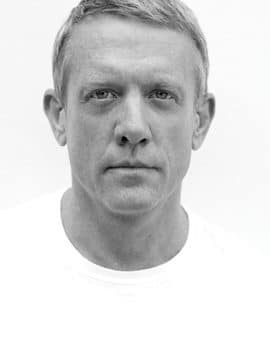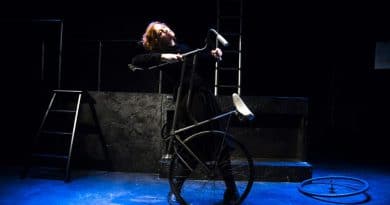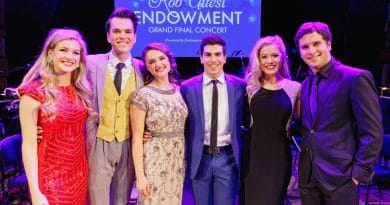Simon Burke: Something About Always – Hayes Cabaret Season
Simon Burke’s cabaret, Something About Always, was populated on its Saturday matinee mostly by people in the entertainment business and older audience members, it seemed, many of them couples, the kind you suspect have followed his career for its whole forty years. It was a comfortable audience and Burke clearly felt comfortable, moving through his script with charming ease, singing with a careless warmth. It was election day, it was mid-afternoon, it was cozy inside. Burke seemed to say, don’t worry, this won’t hurt any of us one bit. You won’t have to think.
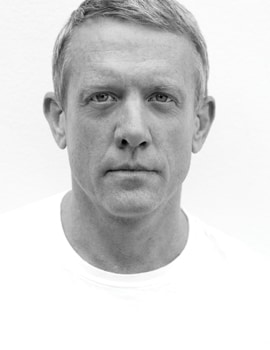
It’s a fascinating and ultimately rewarding approach to take, especially at first. For a more intensive listen to Burke’s rich, rewarding voice, fans can buy his new album of the same name, featuring many of the same tracks. For those in the audience, well, they can sit back and follow Burke’s career from the very beginning. As the lights go down on the stage, scenes from Burke’s career debut, the 1976 film The Devil’s Playground, play on a screen. Burke was thirteen, and won an AFI award for his performance. He is still the youngest person to ever win.
The cabaret takes us through Burke’s career highlights – he sings from A Little Night Music, after dishing some playful Judi Dench gossip (Dench was his co-star in the show) and he seems so pleased and proud of his career. Who can blame him? He’s a natural, empathetic performer; even his performance of ‘Edelweiss’ seems to hit on the gentle tragedy of Captain Von Trapp, and it’s only a low-key moment in the middle of stories about his starring in the London Palladium production (the current Australian tour is modelled on this production) and the connections he still has with his various Von Trapp children’s casts.
Almost the entire show is low-key, in an exceedingly pleasant way; Burke laughingly refers to a hangover from his opening night the night before (and the delightful absurdity of this being, 24 hours later, his closing night). But there are two moments – one performance, and one segue – that do the rare, wonderful cabaret trick of adding poignancy to career highlights and retrospective songbooks. Cabaret is designed for intimacy and revelation, two things Burke doesn’t really need to employ to sell tickets or show audiences a good time. But he makes magic. In these two moments, Burke becomes someone essentially, beautifully human.
After a few light and airy political references (it was election day, after all!) Burke does something so political it still seems surprising, in the context of his older audience, the daylight outside, this show that had felt entirely safe and conservative (but performed with care, and steered, intuitively and generously, by musical director Daniel Edmonds), Burke starts talking about Les Miserables.
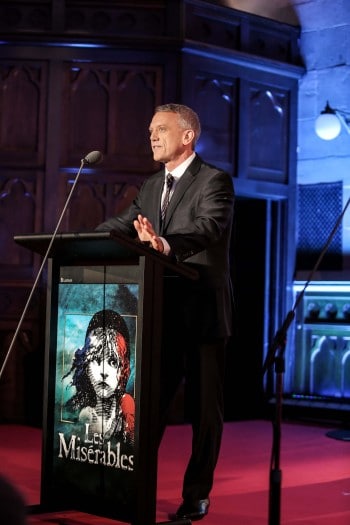
Burke was the first Australian Marius in Les Mis, so of course he’s going to revisit it, but he frames it simply, emotionally. Marius is the show’s young lover turned revolutionary, and he decides at the last possible moment to put aside his brand new love for the sake of his country, and his people, and join the fight with his young, idealistic friends. His friends – every last one of them – dies on the barricades. Marius is left to grieve them.
Burke says, looking right at us, that just a few years after performing Marius’s gorgeously sad song about survivor’s guilt, ‘Empty Chairs at Empty Tables,’ he understood how Marius felt.
Burke is gay, and Les Mis hit Australia for the first time in 1987.
He sings the song with the kind of shattering truth you rarely hear in it; he sings the song like an artist – it’s beautiful – but he sings it like a person, caught in the precarious healing of a community post-AIDS crisis, pre-plebiscite; he sings about himself. His friends. His loss.
And then he sings a jazzy version of the Play School theme.
It’s a genius decision. Immediately Simon Burke, gay man, and Simon Burke, beloved children’s television presenter, are connected in song, in structure, and in the minds of his audiences. Burke’s personal life cannot be separated from his career. And after the theme song comes his Play School friends, Humpty and Jemima and Big Ted, and he pulls up an audience member to do the ‘Itsy-Bitsy Spider’ with him (on opening night, that audience member was Play School presenter favourite Benita Collings).
In a world that just saw a devastating massacre at a gay club in the US, that denies teaching our children about the spectrum of gender and sexuality, that denies young people the chance to watch a documentary about gay families, the firm, so-natural reinforcement of Burke’s personal and public personas existing in one body, as one person that so many people love, is a subversive, invigorating choice.
This light, enjoyable retrospective cabaret suddenly became what every cabaret wishes it could be: a few moments in the dark with a storyteller who can shift the way you see the world. It became queer, it became anything but conservative. It became a declaration of identity.

